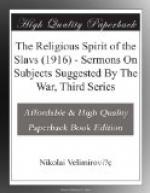The famous Russian literature from Gogol to Dostojevsky is the finest psychological analysis of men. The result of this analysis was: there exists no great man. No one is great: neither Shakespeare nor Napoleon, neither Peter the Great nor Kutuzov, neither the Russian landlords nor the Czar himself, neither Prince Bolkonsky nor Raskolnikov, neither Nero nor St. Paul, neither Beaconsfield nor Osman Pasha, neither Pope nor Patriarch, neither Dalai-Lama nor Sheik-ul-Islam. How could they be great since they must sleep, and eat, and be sick and disappointed, and despair, and die? A review was made by the Russian authors—a review of ancient and modern great men—and a verdict arrived at. For a thousand years Christian Russia kept silent and listened to the hymns to the ancient and modern great men, to the heroes whom they worshipped. She listened to the hymns and worship of the great men while she begrudged praise to the good and saintly and suffering men. Russia is called “Holy,” not because she pretends to be holy, but because her ideal is holiness—not greatness but holiness. She first made use of the word in the nineteenth century. The poet Pushkin first used it, and he used it in the customary way, like Lord Byron, or Goethe, praising the great men, although still alluding here and there to the true Russian ideal—to the good and saintly man. But he spoke not in order to say a new, an original word to the world, but only to break the silence and to attract the attention of the world to Russia. He was the first of a series of preachers. He was listened to and applauded, but he said nothing new. After him followed the preachers: Gogol, Tolstoi, Goncharov, Tchehov, Turgeniev, Dostojevsky, and many others, like a choir, in which three voices are still the strongest and most expressive: Gogol, Tolstoi, Dostojevsky. What did they say?
They held a grand review of the souls, of the ancient and modern souls, and found that there exists no great man among them. That was their verdict. In all their writings they tried to show in the clearest manner, and to the smallest detail, that there is no great man in the world. They analysed everyone who was mentioned and adored by worldly society or by tradition as a great man, and proved that he was not a great man at all. It was very courageous indeed to speak like that in a world which was accustomed from the beginning, in the pagan as in the Christian epoch, to adore greatness, to divinise great men, to imitate and to worship heroes. It was still more courageous to speak like that in the nineteenth century, when the worship of great men found so many advocates, when the name of the demi-god Napoleon filled every corner of the earth; when German philosophy, poetry and music emphasised personality and individuality when the whole continental theology followed the way of Caesar and interpreted Christianity as a teaching and promotion of individualism in human life. Yea, it happened in the time when Carlyle, fascinated




